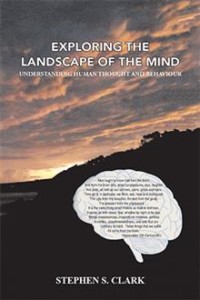Title: Exploring the Landscape of the Mind
Author: Stephen Clark
Publisher: Xlibris
ISBN: 9781524518998
Pages: 730
Genre: Psychology/Biology
Reviewed by: Susan Milam
Buy on AmazonPacific Book Review Star
Awarded to Books of Excellent Merit

In his book, Exploring the Landscape of the Mind, Stephen S. Clark demystifies the workings of the brain. He gives the lay reader insights into how the human brain evolved and how this evolution works with social development. Building on this foundation, Clark explores the problems inherent in balancing the needs of the individual with the needs of society as a whole.
Exploring the Landscape of the Mind is not a casual read. Clark undertakes an enormous task, and the text requires readers to be attentive and committed. However, the author makes his scholarly research accessible by presenting the information in an organized manner rich with interesting details. He begins by laying a foundation of knowledge which helps readers understand the sophisticated concepts found throughout the text. Clark draws from current research as well as historical and literary documents to make his points. This multi-disciplinary approach offers a variety of ways to understand Clark’s overarching thesis and its corollaries.
The book is divided into three sections. The first section, Ourselves Interacting with the World, provides an overview of how the brain receives information and has evolved to better receive that information and then make best use of it. In the process, Clark introduces phenomena such as synesthesia whereby some people receive overlapping sensory stimuli resulting in the ability to “see” sounds, or “taste” words. In addition, Clark delves into the equally important evolution of emotions and debunks the “false dichotomy” between cognition and emotion. Together the evolution of the senses and the evolution of emotions leads to various learned behavioral modules. When combined with language, these modules open the way for communication, collaboration and cooperation.
Having established a common knowledge base, Clark explores cultural evolution in the book’s second section, Living Together. It is through the process of cultural evolution that full humanity is achieved. Moving forward culturally requires not just “better genes” but “better ideas.” In many ways, cultural evolution is more daunting and more dangerous than physical evolution, since it can be hijacked by outside non-evolutionary forces. An examination of becoming fully human by evolving culturally segues naturally into the book’s third section, Challenges and Opportunities. Here Clark hits his true stride when examining the friction between individual goals once they are placed inside the constraints of society.
Although still grounded in science, Clark moves into a more philosophical mode. He contemplates beauty, happiness, pain and loss. In his consideration of these feelings, Clark draws on sources as varied as E. E. Cummings, Søren Kierkegaard and C. S. Lewis. In the last analysis, it is the reader who must decide what it means to be truly human. How does one embrace individual goals and still successfully integrate into society, and how do individuals with personal goals build a society that works toward the common good?
Stephen S. Clark has given himself an enormous task: presenting an overview of the way the human brain has evolved physically and culturally, and then moving from a teaching mode into a philosophical discussion of how human beings can use that knowledge to meet both their individual goals and the needs of society. The book digs deeply into a vast array of scientific and philosophical questions. A number of the concepts explored and the ideas raised by Clark will send readers to the scientific, historical and literary works that he references. Many people who open this book will find that it leads to opening many other books. Inquisitive readers willing to spend time delving into a challenging expansive work will find their efforts well rewarded by Exploring the Landscape of the Mind.



Follow Us